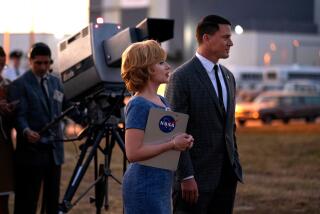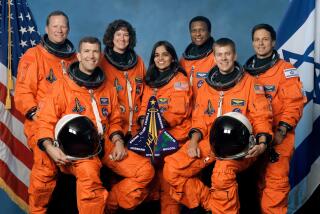‘THE GREAT SPACE RACE’: A BRAND-NEW BALLGAME
- Share via
When the Challenger space shuttle blew up in January, Jo Franklin-Trout was in the midst of editing her four-part documentary series “The Great Space Race” that begins airing next Wednesday on PBS. “We made an insert in the program,” Franklin-Trout says about dealing with the impact of the disaster, “but it didn’t change anything.
“What’s happening with the U.S. space program is only part of the picture. When we began the series a year ago, we wanted to look at the space race and where it’s going. It’s clearly a different ballgame than when it started.
“We wanted to examine the stakes, the goals and who’s playing. Why is a country like China, which has tremendous problems, sinking an enormous amount of money into creating a space program? There are big bucks to be made in space. By the end of this century, it will be one of the most lucrative industries to exist.
“When Challenger exploded, it focused U.S. attention on our space program and brought everyone in the direction the series was already going: How do we stack up against everyone else?”
An award-winning producer, Franklin-Trout put “The Great Space Race” together on a budget of $800,000 (series underwriter is the Boeing Co.). “I went to America’s leading scientific minds and asked them to be our advisory board,” she says. “They were willing to spend a lot of time working with us. They did it for free, thank God.”
After much negotiating, Franklin-Trout was allowed to take her cameras inside the highly secretive Soviet and Chinese space programs. “I’m not interested in good guys and bad guys,” she says. “I’m interested in who is going to do what. ‘Why are these your plans, and why do you think that’s important?’ This is not a myopic view of U.S. interests in space,” she said.
A former producer of “The MacNeil/Lehrer Report,” Franklin-Trout spent five years overseeing nightly coverage of the White House, Congress, the Middle East, defense, space and the environment. In 1982, she began producing major series for PBS. Her programs “Saudi Arabia” and “Oil Kingdoms” took viewers into areas not previously seen by Western TV cameras.
“They said the ‘Saudi’ program could never be done,” Franklin-Trout said with a smile. “People give up too easily. A lot of things that seem like ultimate roadblocks can be gone around or over.
“When we started the ‘Space’ series, we only had the dimmest hopes of getting into the Soviet Union or China. The key was the scientists. Our leading experts are continually conversing with their counterparts in other countries. They weighed in on the Soviets and Chinese and lobbied on behalf of the series to let me come.
“The world’s leading expert on the moon (Gerald Wasserburg) finally just got in touch with Dr. Roald Sagdeev (director of the Soviet Space Research Institute) and said, ‘You ought to do this. I’ve done TV for you, and you should do it for me.’ When Dr. Sagdeev said yes, we went to the Chinese and said, ‘See, Russia’s doing it.’
“We found that American and Russian top planners and technologists agree unequivocally that within two decades there will be a base on the moon, and by 2035 there will be a full-functioning colony on Mars.
“The only real problem we ran into, in fact, involved the head designers at NASA. They were running late in finishing their plans for a Mars colony. We took their designs off the drawing boards and rushed them to our animators.”
A generally unflappable producer, Franklin-Trout admits being surprised that she was given so much access in Russia and China. “We didn’t go into every facility of the Soviet space program,” she says, “but they weren’t paranoid or terribly hysterical. I did find it a little unbelievable that the Chinese allowed me into closed launch sites.
“The Chinese, who at first seemed very stiff, have a tremendous sense of humor. The last night we were in China, we all decided to go out to dinner together. I said to the fellow who’s in charge of the rocket launches that I thought the most impressive part of the launch was the sound. He said to me, ‘I’m so nervous that it won’t get off the ground that my heart is beating so loud I’ve never heard it.’ ”
More to Read
The complete guide to home viewing
Get Screen Gab for everything about the TV shows and streaming movies everyone’s talking about.
You may occasionally receive promotional content from the Los Angeles Times.






